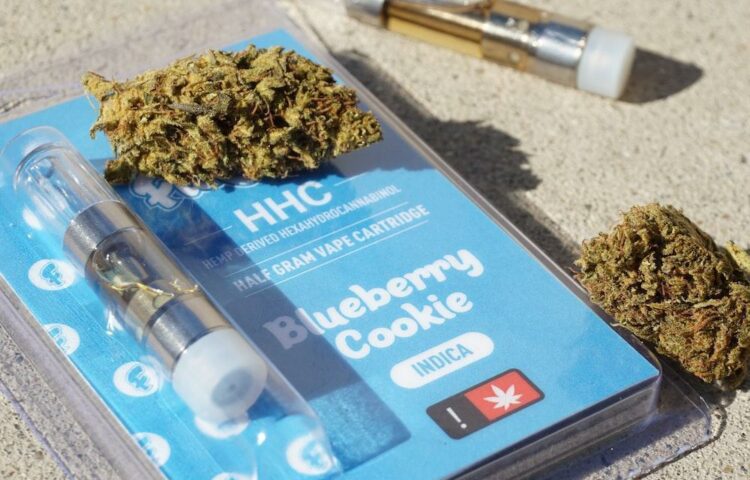The cannabinoids THC and CBD are frequently mentioned in discussions about hemp and marijuana. That said, each version of the Cannabis Sativa L. plant contains well over 100 other cannabinoids. Further research into a few of them has revealed some fascinating effects as well as potential benefits.
THC derivatives such as delta-8 and delta-10 have recently gained popularity as alternatives to the delta-9-THC found in marijuana. Another compound that falls into this territory is Hexahydrocannabinol (HHC). Indeed, it is arguably more perplexing because hemp-derived HHC is not THC, despite producing psychoactive effects. However, HHC can also be processed from other cannabinoids, particularly THC.
The following part offers vital insights into this trendy compound and its long-term effects on the body.
What is Hexahydro cannabinol (HHC)?
HHC is an abbreviation for Hexahydrocannabinol. It’s essentially THC margarine. These two compounds have nearly identical molecular structures, with a few minor differences affecting how they interact in the body.
To obtain HHC, it must undergo a chemical process known as hydrogenation, which involves replacing the carbon bond with hydrogen molecules. As a result, the compound is more stable, less potent, and has a longer shelf life.
HHC synthesized in a lab is semi-synthetic, but it has been discovered to occur naturally in high-potency cannabis plants, classifying it as a minor cannabinoid. However, being a new compound, users are often concerned about HHC effects in long term and its benefits.
The following part lists five such effects of HHC that users can expect.
1. It may help with energy and refreshment
Considering HHC is a psychoactive cannabinoid that can cause intoxication, it is best consumed in the morning. You can anticipate a peaceful and enjoyable exhilaration.
After a stressful and hectic day, you may find consuming HHC to be relaxing, which may aid in calming you down and help you sleep.better HHC can energize and refresh you, allowing you to forget about your daily worries and enter a state of euphoria.
2. It may offer soothing effects
HHC-containing products like HHC pain salves are often used as therapy alternatives. Topical creams contain a lot of HHC, which is absorbed through skin layers into the bloodstream. This, aided with other supplements, can help relax tight and sore muscles.
3. May increase appetite
High doses of THC and its derivatives are often associated with an increased appetite or “the munchies.” While cannabinoid munchies can be beneficial in some situations, some look out for the potential weight gain that comes with them. In high doses, HHC, like THC, may increase appetite.
4. May induce euphoria
HHC is a psychoactive substance that can cause users to feel euphoric. Hundreds of products on the market use HHC to create an intoxicating effect. However, unlike THC, the effects of euphoria in HHC are not as severe.
Most cannabis users who use HHC claim that the high they get from the cannabinoid is easily controllable. Additionally, they can also go about their daily lives without being hindered by the high they get from using HHC.
5. May alleviate nausea
THC is often associated with reducing nausea and vomiting. There have been numerous studies that confirm THC’s anti-emetic properties.
Because of its similarity to THC, HHC may help alleviate nausea. Even though anecdotal evidence supports it, more research is needed to confirm its anti-nausea properties.
Is HHC legal?
The Agriculture Improvement Act of 2018 appears to allow the use of cannabis plant parts containing 0.3% or less THC. Hemp is the legal term for these plant parts.
This means that cannabinoids from hemp, such as Delta-8 THC and HHC, containing less than 0.3%THC are legal. However, some experts argue that they are illegal because you must modify them in a laboratory.
How does HHC work in the body?
HHC binds to the CB1 and CB2 receptors in the endocannabinoid system, like THC, because of their nearly identical chemical structures.
All mammals have a signaling system called the endocannabinoid system. It aids in regulating vital functions such as sleep, pain, memory, the immune system, mood, hunger, and many others.
Cannabis-derived cannabinoids like HHC fit like a key into these receptor locks to initiate a biological process.
The main distinction between HHC and THC is their potency. HHC has a lower strength than THC but still has psychoactive effects.
When you consume HHC, the compound enters your bloodstream and travels to your brain. This changes your mood, perception, and appetite—in other words, it can make you high.
Significantly, cannabinoids affect people differently, which is why some people are more vulnerable to adverse effects.
In general, the higher the HHC concentration, the more intense the high.
Is HHC safe?
Any information currently available about the safety of HHC is speculative because there have never been any safety studies on it.
That being said, the popularity of HHC is growing, and many people are already using it daily. There have been no reports of severe side effects. According to preliminary research, it has a similar safety profile to THC.
Third-party lab tests for heavy metals (including iridium, rhodium, palladium, nickel, rhenium, platinum, and ruthenium) and chemical solvents are always recommended (including hexane, toluene, benzene, butane, and heptane).
Bottomline
HHC is a cannabinoid that has similar effects to THC. It is found in trace amounts in some cannabis strains and has been shown to bind strongly to the CB1 receptor, though not as strongly as THC.
Although this hydrogenated form of THC has been around for a while, there hasn’t been as much research on its effects. To summarize, it is expected to behave similarly to THC. While more research is needed to confirm HHC’s full therapeutic potential, it clearly shows promise as a cannabinoid worth investigating.

